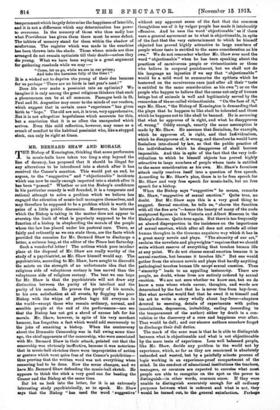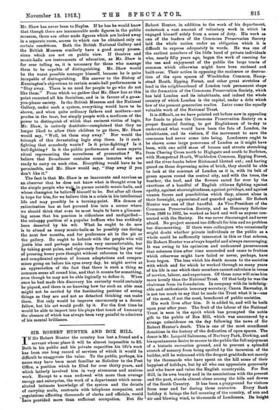MR. BERNARD SHAW AND MORALS. T HE Bishop of Kensington, thinking
that some performers in music-halls have taken too long a step beyond the line of decency, has proposed that it should be illegal for any alterations to be introduced into a sketch after it has received the Censor's sanction. This would put an end, be argues, to the "suggestive" and "objectionable" incidents which can now be easily enough imported into a sketch after it has been "passed." Whether or not the Bishop's confidence in his particular remedy is well founded, it is a temperate and rational attempt to solve a problem which we believe has engaged the attention of music-hall managers themselves, and may therefore be supposed to be a problem which is worth the pains of a little public discussion. Moreover, the interest which the Bishop is taking in the matter does not appear to overstep the limit of what is popularly supposed to be the function of a bishop in shepherding the morals of the people whom the law has placed under his pastoral care. There, ae fairly and reticently as we can state them, are the facts which provided the occasion for Mr. Bernard Shaw to discharge a letter, a column long, at the editor of the Times last Saturday.
Such a wonderful letter ! The notions which pure intellect place at the disposal of Mr. Shaw are really worthy of the study of a psychiatrist, as Mr. Shaw himself would say. The psychiatrists, according to Mr. Shaw, have sought to discredit the saints on the strength of an unfortunate idea that the religious side of voluptuous ecstasy is less sacred than the voluptuous side of religious ecstasy. The best we can hope for Mr. Shaw is that the psychiatrists will not draw any distinction between the purity of his intellect and the purity of his morals. He proves the purity of his morals, to his own satisfaction at all events, by flogging the poor Bishop with the whips of perfect logic till everyone in the world—except those who remain ordinary, normal, and sensible people at the end of the performance—can see that the Bishop has not got a shred of excuse left for his morals. Mr. Shaw, however, in spite of his very mordant humour, has forgotten a fact which would add enormously to the joke of smashing a bishop. When the controversy about the Dramatic Censorship was in full swing some time ago, the chief opponents of the censorship, who were associated with Mr. Bernard Shaw in their attack, pointed out that the censorship was obviously ineffective, because it was notorious that in music-hall sketches there were improprieties of action or gesture which went quite free of the Censor's prohibition— thus proving that the written word was not everything when censoring had to be done. Now the scene changes, and we have Mr. Bernard Shaw defending the music-hall sketch. He appears to think the stick a very good one for beating the Censor and the Bishop at the same time.
But let us look into the letter, for it is an extremely interesting study psychiatrically, so to speak. Mr. Shaw says that the Bishop " has used the word ' suggestive'
without any apparent sense of the fact that the common thoughtless use of it by vulgar people has made it intolerably offensive. And he uses the word ' objectionable ' as if there were a general agreement as to what is objectionable, in spite of the fact that the very entertainment to which he himself objected has proved highly attractive to large numbers of people whose taste is entitled to the same consideration as his own." We do not remember whether Mr. Shaw ever used the word "objectionable" when he has been speaking about the practices of carnivorous people or vivisectionists or those who believe in corporal punishment, but we shall not do his language an injustice if we say that "objectionable" would be a mild word to summarize the epithets which he bestowed on the carnivorous ones (and after all their " taste is entitled to the same consideration as his own ") or on the people who happen to believe that the cause not only of human beings but of animals is well and legitimately served by the researches of the so-called vivisectionists. " On the face of it," says Mr. Shaw, " the Bishop of Kensington is demanding that the plays that he happens to like shall be tolerated and those which be happens not to like shall be banned. He is assuming that what he approves of is right, and what be disapproves of. wrong." Oddly enough, exactly the same assumption is wade by Mr. Shaw. He assumes that Socialism, for example, which he approves of, is right, and that Individualism, which he disapproves of, is wrong, and therefore he would have Socialism introduced by law, so that the public practice of the individualism which he disapproves of shall become impossible. And this in spite of the fact that the very indi- vidualism to which be himself objects has proved highly attractive to large numbers of people whose taste is entitled to the same consideration as his own. Mr. Shaw's ferocious attack really resolves itself into a question of free speech. According to Mr. Shaw's plan, there is to be free speech for Mr. Shaw and very free speech for music-halls, but no free speech for a bishop.
When the Bishop says "suggestive " he means, remarks Mr. Shaw, " suggestive of sexual emotion." Quite true, no doubt. But Mr. Shaw says this is a very good thing to suggest. Sexual emotion, he tells us, " shares the function with all the fine arts "—hence the beauty of many of the nude sculptured figures in the Victoria and Albert Museum in the Bishop's diocese. Quite true again. But there is too frequently an absurd disproportion in the insistence on the importance of sexual emotion, which after all does not exclude all other human thoughts in the tiresome expulsive way which it has in a great many novels and plays. "The sincerity of our art," exclaim the novelists and playwrights " requires that we should write without reserve of everything that touches human life at any point. We do not choose sexual emotion because it is sexual emotion, but because it touches life." But one would gather from the sincere novels and plays that hardly anything Pathological touches human life except sexual emotion. Thus "sincerity" leads to an appalling insincerity. There are people, no doubt, whose lives are entirely ordered by sexual emotion. We are not sure whether we know one, but we do know a man whose whole career, thoughts, and words are determined by the fact that he is never free from hay-fever. But what novelist would feel that be owed it to himself and his art to write a story wholly about hay-fever—chapters devoted to sneezing, details of experiments with pollen inoculations, depression, irritability, ending (according to the temperament of the author) either by death in a con- vulsion or the discovery of a cure and happiness ever after. That would be dull; and our sincere authors somehow forget to discharge their dull duties.
The mark of the sane man is that he is able to distinguish between what is objectionable and what is not objectionable by the mere tests of experience. Less well balanced people, like Mr. Shaw. decide any problem in the world not by experience, which, so far as they are concerned is absolutely unheeded and wasted, but by a painfully minute process of logic working in an experience-proof compartment of the mind. In the conduct of educational institutions the teachers, managers, or curators are expected to exercise what most people are able to recognize on the spot as the power to distinguish—in other words, common sense. If they were unable to distinguish accurately enough for all ordinary purposes between what is indecent and what is not, they would be turned out, to the general satisfaction. Perhaps
Mr. Shaw has never been to Naples. If he has he would know that though there are innumerable nude figures in the public museum, there are other nude figures which are locked away in a separate room, access to which can be obtained only on certain conditions. Both the British National Gallery and the British Museum similarly have a good many posses- sions which are not on public view. If theatres and music-halls are instruments of education, as Mr. Shaw is for ever telling us, it is necessary for those who manage them to be capable of distinguishing. Mr. Shaw would be the worst possible manager himself, because he is quite incapable of distinguishing. His answer to the Bishop of Kensington's objections to certain music-hall performances is "Stay away. There is no need for people to go who do not like them." From which we gather that Mr. Shaw has at this point recanted all his Socialism, and is in favour of a go-as- you-please society. In the British Museum and the National Gallery, under such a system, everything would have to be shown, and when quite ordinary fathers and mothers—not prudes in the least, but simply people with a modicum of the power to distinguish of which that eminent victim of logic, Mr. Shaw, is entirely destitute—complained that they no longer liked to allow their children to go there, Mr. Shaw would say, "Well, let them stay away." Nor would the triumph of this devastating logic stop there. Is it cock- fighting that somebody wants P Is it prize-fighting P Is it bull-fighting P Is it the public performance of some mystic ritual representing the sacredness of procreation P We believe that Broadmoor contains some inmates who are ready to carry on such rites. Everything would have to be permissible, and Mr. Shaw would say, " Stay away if you don't like it."
The fact is that Mr. Shaw is so inaccurate and careless as an observer that he does not know what is thought even by the simple people who wa4iiin queues outside music-halls, and whose champion he believM himself to be. But after all there is hope for him, for we believe this is a crisis in his intellectual life and may possibly be a turning-point. His demon of ratiocination has at last pursued him into a corner where we should think that even he must begin to have a glimmer-. ing sense that his position is ridiculous and undignified— the unhappy position of a popular buffoon who has suddenly been deserted by his wit. What he ought to do now is to attend as many music-halls as he possibly can during the next few months, and for preference sit in the pit or the gallery. He ought to hobnob with the people who will jostle him and perhaps make him very uncomfortable, but by taking great pains, and vigorously forswearing his pet vice of pressing home pure thought without reference to the vast and complicated system of human adaptations and compro- mises going on before his eyes every day, he might arrive at an appreciation of the fact that there is such a thing as .common sense all round him, and that it counts for something, even though he may not be able logically to define it. When once he had made this discovery his curiosity would certainly be piqued, and there is no knowing how far such an able man might not be carried by the fascinating pastime of seeing things as they are and not as detached thinking can make them. Not only would be improve enormously as a decent fellow, but his art would profit by it. For the first time he would be able to import into his plays that touch of humanity the absence of which has always been very painful to admirers of his mental brilliance.































































 Previous page
Previous page